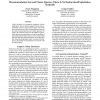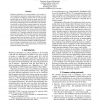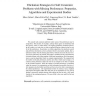112
click to vote
TVCG
2012
13 years 4 months ago
2012
—This paper describes a new method to explore and discover within a large data set. We apply techniques from preference elicitation to automatically identify data elements that a...
231
click to vote
Publication
We generalise the problem of inverse reinforcement learning to multiple tasks, from multiple demonstrations. Each one may represent one expert trying to solve a different task, or ...
147
click to vote
AAAI
2011
14 years 2 months ago
2011
Utility elicitation is an important component of many applications, such as decision support systems and recommender systems. Such systems query users about their preferences and ...
158
click to vote
Publication
We state the problem of inverse reinforcement learning in terms of preference elicitation, resulting in a principled (Bayesian) statistical formulation. This generalises previous w...
134
click to vote
EOR
2011
14 years 5 months ago
2011
Combinatorial auctions have been used in procurement markets with economies of scope. Preference elicitation is already a problem in single-unit combinatorial auctions, but it bec...
133
click to vote
GI
2010
Springer
14 years 11 months ago
2010
Springer
Abstract: Preference elicitation is often used in e-services to create product recommendations for their customers. We present an approach for applying preference elicitation techn...
113
click to vote
CORR
2002
Springer
15 years 1 months ago
2002
Springer
Preference elicitation is a central problem in AI, and has received significant attention in single-agent settings. It is also a key problem in multiagent systems, but has receive...
139
click to vote
AMAI
2005
Springer
15 years 1 months ago
2005
Springer
We consider auction design in a setting with costly preference elicitation. Well designed auctions can help to avoid unnecessary elicitation while determining efficient allocations...
110
click to vote
AI
2010
Springer
15 years 2 months ago
2010
Springer
We consider soft constraint problems where some of the preferences may be unspecified. This models, for example, settings where agents are distributed and have privacy issues, or ...
139
click to vote
ATAL
2010
Springer
15 years 3 months ago
2010
Springer
Minimax-regret preference elicitation allows intelligent decisions to be made on behalf of people facing risky choices. Standard gamble queries, a vital tool in this type of prefe...



